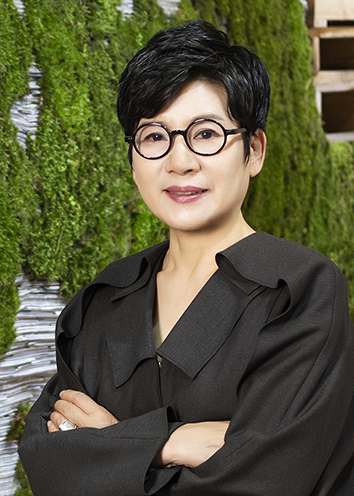The Lightness of Being
Artist Kim Juyon
Interviewd by Dhivyaa S. P.
When I first saw Kim Juyon’s work at the City Museum’s exhibition hall, I was intrigued by her modern artworks, as I had grown most accustomed to only two-dimensional pieces. In her art, the sight of seeds meticulously sprinkled on fabric and growing into life allowed me a sense that life and death coexist. Clothes, originally meant to protect the human body, lose their function and instead become a foundation for new life to flourish. However, Kim Juyon takes this a step further. During the exhibition, she includes the entire life process – from the sprouting of new life to its full bloom and eventual disappearance – as part of her artwork.
Poets say that overly descriptive poems do not leave room for the reader’s imagination, while overly abstract ones lose their emotional impact, making poetry writing far from easy. Modern art seems to have a similar dilemma. Finding the right balance of metaphor in artworks that can resonate with viewers feels akin to writing poetry, but that is the challenge that Kim Juyon has taken on.
The featured artist for this issue of the Gwangju News is Kim Juyon. After graduating from the Department of Fine Arts at Chonnam National University, she obtained her Meisterschülerin from the Berlin University of the Arts (UdK, Germany) and has been actively creating art in Germany and Seoul for many years. I recently had the opportunity to interview Kim Juyon to discuss her art.
Jennis: Hello and thank you for your precious time. You are a modern artist not often encountered in this region. This spring, you participated in a group exhibition titled “Generative Mind” with two other artists at Choi Sang-jun Art Museum just outside of Gwangju in Hwasun County. You planted moss on layers of newspapers to make what looked like a world map, and the piece was titled Yi-suk Can you tell us what yi-suk means?
Kim Juyon: The story behind the title Yi-suk dates back to my time studying in Germany. During my studies at the Berlin University of the Arts, my professor asked me about Eastern philosophy, things like yin and yang. Growing up in Korea, which had rapidly modernized and whose consciousness had Westernized, thinking about Eastern philosophy brought me great confusion. It led me to question my identity, so I decided to study it on my own for four to five years with books sent by my father, who was a professor of philosophy. He always said that understanding history and philosophy was essential to becoming a true artist. Through this self-study, I became interested in the life that forms the world. Being a vegetarian, I often planted vegetable seeds around the house and ate what I grew. One day, noticing sprouts growing from a loofah sponge, I was struck by the wonders of life. I realized that this might be what Buddhism refers to as yi-suk. Literally translated, yisuk (이숙) means “all lives ripen differently according to cause and effect,” but I think it also implies enduring the joys and sorrows that arise from those processes.
Jennis: You stacked up 8,000 copies of newspapers and planted moss on top of them to create the image of a world map. Why did you choose newspapers as a material for this?

Kim Juyon: Newspapers are a form of media that contains stories of their times, including politics, history, and culture. They symbolize nurturing life atop the stories of an era.
Jennis: I have previously seen your work at the Gwangju Museum of Art in which seedlings sprout from an article of clothing. I wonder why you titled that work The Lightness of Being?

Kim Juyon: In 2011, I stayed at the King George Island Sejong Station in Antarctica for a month-long residency. During the white nights, I endured the cold and wind alone while filming the changing seascape. At the moment a giant iceberg moved towards me, I felt an unreal sense of awe and simultaneously a profound fear, realizing that this fear was essentially the fear of death. Standing before immense and sublime nature, I felt the insignificance of a single human existence. After returning to Korea, over the span of five years, I created ten pieces titled The Lightness of Being. These works metaphorically express the ephemerality of life through seeds – germinating, growing, changing, and eventually perishing – on clothes, which symbolize human existence.

Jennis: For the last question, could you tell us about the direction you see your future works going in?
Kim Juyon: Depending on the project, the form of my work may change, but I believe my ecological approach will continue.
Jennis: Thank you for your valuable time for this thought-provoking interview for the Gwangju News.
The Interviewer
Kang Jennis Hyunsuk is an explorer of art galleries and museums on weekends. She has been doing oil painting for almost a decade, and she has learned that there are a lot of fabulous artists in this City of Art. During weekdays, She loves to play with kids at her English school in the Suwan area of Gwangju. Instagram: @jenniskang



